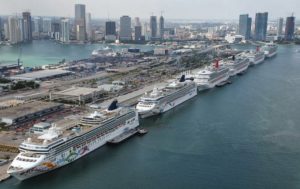Florida Governor Death Vader’s anti-mask, anti-vaccine policies are squarely at odds with the pro-survival approach championed by the federal Centers for Disease Control (CDC), and the conflict came to a head in a battle over cruise ship regulations in a federal courtroom where a Bush-appointed Republican judge sided with the state.
Now, a federal appeals court has blocked that judge’s order from taking effect (read story here). That means the CDC’s regulations on cruise ships remain in effect for now. This isn’t the final word, though; only a stay of the judge’s order. There was no accompanying explanation of the appeals court’s reasoning. That will come later, along with the appeals court’s ultimate decision.
So, we don’t know yet how this federal-vs.-state power struggle will shake out in the end.
The United States is a collection of states, with the totality of governmental power and authority divided up between the federal government and state governments. The details are fascinating stuff for legal scholars immersed in constitutional federalism and the minutiae of whether statutory procedures were followed, drudge work for lawyers and judges, and either a tedious bore or a matter of complete indifference for everyone else.
For the average American, it boils down to whether you have to get a shot or two before boarding a cruise ship in a Florida port. It can be a big deal if you’re one of those suicidal people who refuse to get vaccinated and insist on consorting with other unvaccinated people in the tight confines of a good-times ship.
As a federalism issue, though, it’s neither ambiguous nor nuanced. Federal supremacy has always reigned over maritime matters. If you’re a Seattle motorist stuck in a traffic backup behind the raised University Drawbridge while a sailboat putt-putts through the Montlake Cut, thank federal supremacy over waterways. The sailboat takes precedence over car traffic (with this caveat: by agreement between the city and Coast Guard, there are some limitations on drawbridge openings during rush hour).
Moreover, that makes perfect sense. Even cruise ship operators will tell you they’d rather have a single set of rules to comply with, as opposed to having somehow to accommodate a plethora of varying state rules. In addition, cruise ships operate in international waters, and make foreign port calls. Letting Florida dictate pandemic safety measures (or, more accurately, lack thereof) for cruise ships docking at Florida ports makes no more sense than allowing Florida to issue its own passports for foreign travel, or deciding which foreigners can (or can’t) come into the U.S.; these are all federal matters, and should be, for reasons that should be pretty obvious.
The initial ruling most likely won’t stick. Even absent any explanation, when an appeals court stays a lower court’s ruling, that’s usually a clear sign the appellate judges see a problem with the ruling and won’t uphold it when they get around to issuing an opinion.
From there, it could go to the Supreme Court, but the latter accepts a very limited number of cases for review and this matter might not be weighty enough — or the proper result may be so obvious — that it will brush aside Florida’s petition for certiorari because it has better things to do than entertain the bleatings of a governor who only cares about raking in tourism dollars and is eager to risk the tourists’ lives to get those dollars.
This, notwithstanding the fact there’s a pretty good chance of that governor being the GOP’s 2024 presidential nominee. If that happens, you should ask yourself as a voter whether you want a governor determined to cram unvaccinated tourists into the crowded confines of cruise ships dictating policy for the entire country instead of for one state.
Photo: Cruise ships lined up at the Port of Miami
